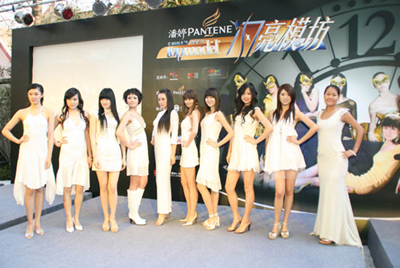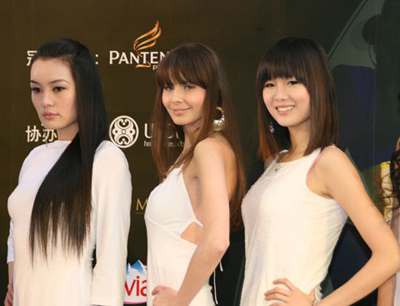"Tasteful" and "reality TV" may sound like a contradiction but after authorities nixed really vulgar shows, producers are scrambling to come up with new golden eggs.
Teenage girls screaming, moaning and fainting have been familiar sights in reality shows like "Super Girls" and "My Hero" but authorities have said enough to vulgar idol worship.
Reality shows have been banned from prime-time TV and other restrictions have been applied to the programs. Decisions have not been made on screening "My Hero" (Dragon TV) and "Super Girls" (Hunan Satellite TV) this year. New restrictions ban live shows, voting by cell phone and suggestive, vulgar performances and talk.
Desperate producers have been scrambling to preserve sure-fire money makers, while not bringing down the wrath of the censors. They are trying different formats.
Two new reality shows promise to be fun, informative and even tasteful - "2008 Pantene China's Next Top Model" and "No Free Lunch."
"Top Model" focuses on 10 aspiring models of different backgrounds, shapes and sizes who live together in a loft and vie for an enviable modeling contract.
The 10-episode show and contest will debut on Sichuan Satellite TV on Sunday night.
It adopts the format of CW Television Network's popular "America's Next Top Model." The 10 have been chosen from among 6,000 applicants.
David Tumaroff, CEO of Mojo Media Works and producer of the US show, has collaborated with Chinese TV producers on reality shows such as Dragon TV's "My Show" and "Winner."
"Among all the reality shows in the United States, 'America's Next Top Model' is the only one that doesn't try to promote fighting," Tumaroff says. "It's just about the natural process of one ordinary girl becoming a model."
Three veteran camerawomen will live with the contestants and show the transformation of ordinary young women into potentially powerful supermodels.
On camera, the models will be taught how to walk on a fashion runway, how to respond to interview questions, and how to show off an automobile. They will also have their professional photos taken; their "look," make-up and personalies will be assessed.
At the end of each episode, judges will eliminate one candidate they consider to be the weakest. Judges include fashion designer Vivienne Tam, supermodel Li Ai and photographer Cheung Man-wah.
Tumaroff says the three finalists will compete in Macao for a modeling contract with a top international modeling agency, probably the Nextmodels Agency. The date has not been set, but it probably will be in March.
The winner will also become the new spokeswoman and model for Pantene hair care products.
"The show will provide an insight into the tough and demanding road to becoming a supermodel," says model Li. "A beautiful appearance is not everything. She needs to cultivate her own talents and charisma."
In Tumaroff's opinion, the story is everything in this show. "The contestants have very unique backgrounds," he says. "Actually they are reality show cast, not just models."
Tumaroff says that though reality TV shows in China face a lot of regulations, they still have a place in its television industry and they should be carefully and tastefully produced.
"In China this genre of shows has been removed from prime-time TV, but it may create a new market," he says. In the United States, TV experts predict reality TV will retain its popularity for at least 10 years.
"No Free Lunch," which began last Sunday night on CBN, is a fun and "brainy" business show competition for entrepreneurs and white-collar workers.
The prize is lunch with a top CEO.
It is modeled on the US show featuring Donald Trump, "The Apprentice," though it doesn't offer a real apprenticeship. It will run weekly for the entire year.
A machine on stage will measure contestants' pulse and heart rate - to make the questioning more exciting.
In each episode, two promising young candidates go through several rounds of TV interviews and show their business savvy and creativity. They vie for a lunch date with the boss of a major enterprise, such as Kathy Xu, founder and president of Capital Today Group, and Thomas Doctoroff, CEO of JWT Greater China.
Both contestants face sharp questions and challenges from the boss himself or herself, and from a jury comprised of a psychologist, human resources expert and social celebrity.
The show features business case simulations. Contestants play the roles of salesmen, negotiators and managers in improvised mini-dramas.
Finally the boss will invite one to lunch to learn more about business. Technically, it's just lunch, but clever winners will try to parlay that meal and tasty contacts into business opportunities.
Yang Hui, the show's producer and president of Vivid Media, says it's another attempt to create an indigenous Chinese business/entertainment show after presenting "Boss Town," which gathers well-known Chinese entrepreneurs for discussion, and "Work Stuff."
"However, this show is not that heavy and serious as we try to make it both useful and entertaining," Yang says.
"The character of each candidate will be revealed in the limelight. To add fun, there's the heart and pulse monitor that everyone can see."
(Shanghai Daily January 11, 2008)




